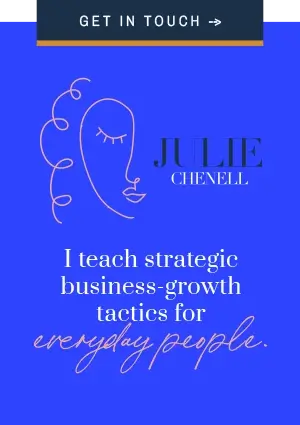Subscribe On:
Full Transcript:
Hey everyone, what’s up? This is Julie, today I want to talk to you about making decisions. Specifically about making decisions about big purchases. Now, whether this is in life or business, all of us have opportunities to make big purchases, right.
Whether it’s, “Should I take that vacation? Should I hire that coach? Should I do that mastermind? Should I buy that house?” It is hard to make decisions about whether or not you can afford something big, because we all don’t have a crystal ball of what’s going to come in the future, what kind of contingency plans we need, what’s a safe amount, your risk tolerance. There’s just so many caveats and variations.
And I’ve been thinking about this because I’ve been sort of on a money bender here, talking about 2020 and money advice, and now Alex and I are house hunting. And the question has been sort of thrown around, “How much can we afford for a house?” Now, keep in mind that in 2016 I made $325,000 and it’s now 2020 and I made $2.2 million. So there’s a big jump between, in those last 4 years. And the last time I tried to buy a house, we got preapproved for a $400,000 mortgage. At the time in 2016 that seemed really high. It also meant that when we did buy a house, which was at the time, $350,000 a 20% down payment was everything we had. It was, I believe I had $80 or $90,000 in a savings account. And we had to put down $80,000.
So we had like $10,000 for closing costs or that kind of thing, and it was a lot of money. It was a lot of what we had. I haven’t done anything like that since 2016. Now, there’ve been a few big purchases I’ve made, investing in coaches, masterminds, travel experiences, purchasing Club 33 for my family, which is the most ridiculous non-financially savvy purchase you can imagine. But I have not really had anyone from the outside come into my life and my world and say, “This is what you can afford.” And keep in mind that when a mortgage company, or a coach, or a financial advisor says, “This is what you can afford.” What lens are they looking through it for? So that’s important to ask yourself.
So we went through the preapproval process again, and we were preapproved for a $3 million dollar home, which completely caused a whole identity crisis moment for me, because I could not imagine living in a $3 million home. It took me a minute to grasp that that’s how far I had gotten because I had just been sort of focusing on my customers, focusing on my clients, delivering value, putting money away and living within my means. So to be told, “You can afford a $3 million home.” And then going on realtor and zillow and looking at what $3 million homes can do, created this gap for me of like, “That’s not who I am. But that’s who they’re telling me I am.”
Now, another thing I want to just make mention here is that mortgage people, they want you to take out a big loan. So I’m aware that just because I can get a $3 million loan, doesn’t mean I should. So a lot of us have these kinds of experiences in life. So here are 5 questions that I recommend you ask yourself when you’re trying to make a big purchase. Home, business, otherwise, it doesn’t matter.
The first question is, can you afford the initial investment? Can you pay it in full? Can you pay it over time? Do you put it on a credit card? Now, the reality is that for each person that risk may be different. So for some people, putting something on a credit card is not a bad decision because they know that the ROI and the return is going to be there. for other people who are more conservative, putting it on a credit card is not going to feel right, it’s going to cause them a lot of stress, they’re not going to be able to focus, and then it’s going to reduce their performance. So you need to make the decision, what does “afford” mean to you? The risk gets higher obviously, but that’s you know, different strokes for different folks.
So asking myself this question, paid in full, paid over time, paid on a credit card, can we afford the initial investment of a $3 million home, the answer is yes. Do I want to spend that kind of money? No. But of course as life would have it, Alex and I found a home, it’s listed at 2.2 million and so I was crunching the numbers. Can we put 20% down on that $2.2 million home? Yes we could. It would be about $450,000 down. So we could afford that, and we would want to put 20% down so we wouldn’t have to pay primary mortgage insurance.
So the second question you’re going to ask yourself when making a big purchase is, can you afford the ongoing investment? So if it’s a mastermind, maybe the initial investment is $5K and then the ongoing is $2K, can you afford that? And that really boils down to a percentage. And you can find percentages for every benchmark ever, again, it’s very personal. But you know, for home buying for example, they say that your mortgage should not be more than 30%, and your mortgage should include your taxes and your insurance. It shouldn’t be about more than 30% of your monthly budget. So if you’re thinking about a mastermind, that percentage might be different.
So for us, I was like, “Okay, 20% down, $18,000 a year in taxes, insurance, that would cost us between $8 and $9,000 a month at $2.2 million. And I bring home between $30 and 40, that puts us right at that percentage mark. So okay, we’re okay.”
Then the third question you want to ask, what are any additional costs associated with the investment. So this is, these are like hidden costs. So if you’re in a mastermind or coaching, are you going to need ad spend, are you going to need to hire people, are you going to need additional tools? You want to ask yourself those questions. Not because you want to be a Debbie Downer, but because you want to just know. For us we need to know, closing costs are going to be $30,000. It’s probably going to cost us $50,000 to hire movers and to buy some new furniture, because that house is big. So we need to think about that. And then we also need to think about things like, how much higher is the electric bill going to be? Do we need to hire stable hands and lawn care people? And all those expenses, you just want to think about them before you a big decision.
And then you get to do the fun questions. The questions that are really important because between time and money, time is far, far, far more valuable. What are the ongoing benefits of your investments, and can you get the money back in some way? I always like to do the benefits one first, and try to think of non-monetary benefits, because we can always come up with ROI type stuff, but what are the non-monetary benefits? When I think about people who’ve joined my mastermind, they don’t see it until they’re in it, but things like “Oh my gosh, when that happened and shit hit the fan, I didn’t quit because I had a coach and I had a team behind me.” Or, “I got a new referral relationship, I got a connection. I got an open door that I couldn’t have gotten opened on my own.” Things like that you know, really do have a monetary ROI but not at first glance, but are incredibly important.
So sit with your benefits and then ask yourself, “Will this help me create new money, saved money, or found money?” and new money is you know, new customers, new revenue streams. You know buying a new home isn’t going to create new money for us unless of course we were going to rent out an in-law apartment or something. Saved revenue would be things that are now more efficient. So let’s say you joined a mastermind and that coach helps you avoid mistakes and lost opportunities and not hire people that are going to cost you a lot of money, so saved money. And then found money, which means making more with what you’ve got. Getting your customers to spend more, buy more, that kind of thing.
So, you know, obviously for us personally, real estate is a pretty safe investment over time. Of course you’ll find plenty of people who say otherwise, but most of the wealthiest people on planet earth own real estate, so there’s that. In a worst case scenario we might not get all of our money back. But we could at least get our original investment back. So if we put $450,000 in, we probably would get it back, even if we had to sell. So you know, you want to ask yourself that question.
And the last question you want to ask is, “What stage of life or business are you in right now? And is it conducive to what you want to do?” and this is really the time/money question. And I’m reading a book called Die with Zero, it’s a very good read. I will warn you that if you are a spender be careful reading it. I am not a spender, I am a saver, so this is really helping me to see how important it is to not over-save.
Anyway, the question for us is like, “Well, if we’re not going to buy a big farm now, when are we?” We’re not going to buy it in our 60’s, so if we don’t do it now, it’s not going to happen. So I’m sitting with the idea of, am I okay living a life where that never comes to fruition. And if I say to myself, “Gosh, I’d be really sad if I didn’t get a chance to experience what that was like.” Then that’s my answer. And that ultimately kind of trumps all the other ones, because you find when you have that question before you, it’s sort of that life or death question, you find your decision making completely changes. You just can’t live there 100% of the time because otherwise we’ll all just spend money like it’s going out of style.
So those are the questions when evaluating a big purchase. Can you afford the initial investment? Can you afford the ongoing investment? What are the hidden costs of the investment? What are the benefits of the investment? Can you get the money back? What is the ROI? And what stage of life or business are you in right now and is it conducive to what you want to do?
Lots of people have been asking, and by the time this gets published, I’m sure we’ll have a bigger update, we decided to go ahead and put an offer in on the home, we will see what happens. We did not offer $2.2, we offered considerably lower, so they may reject our offer. But it has been a really fun exercise, and quite an identity shift to start thinking about these questions. So I appreciate you all, talk to you soon.









0 Comments